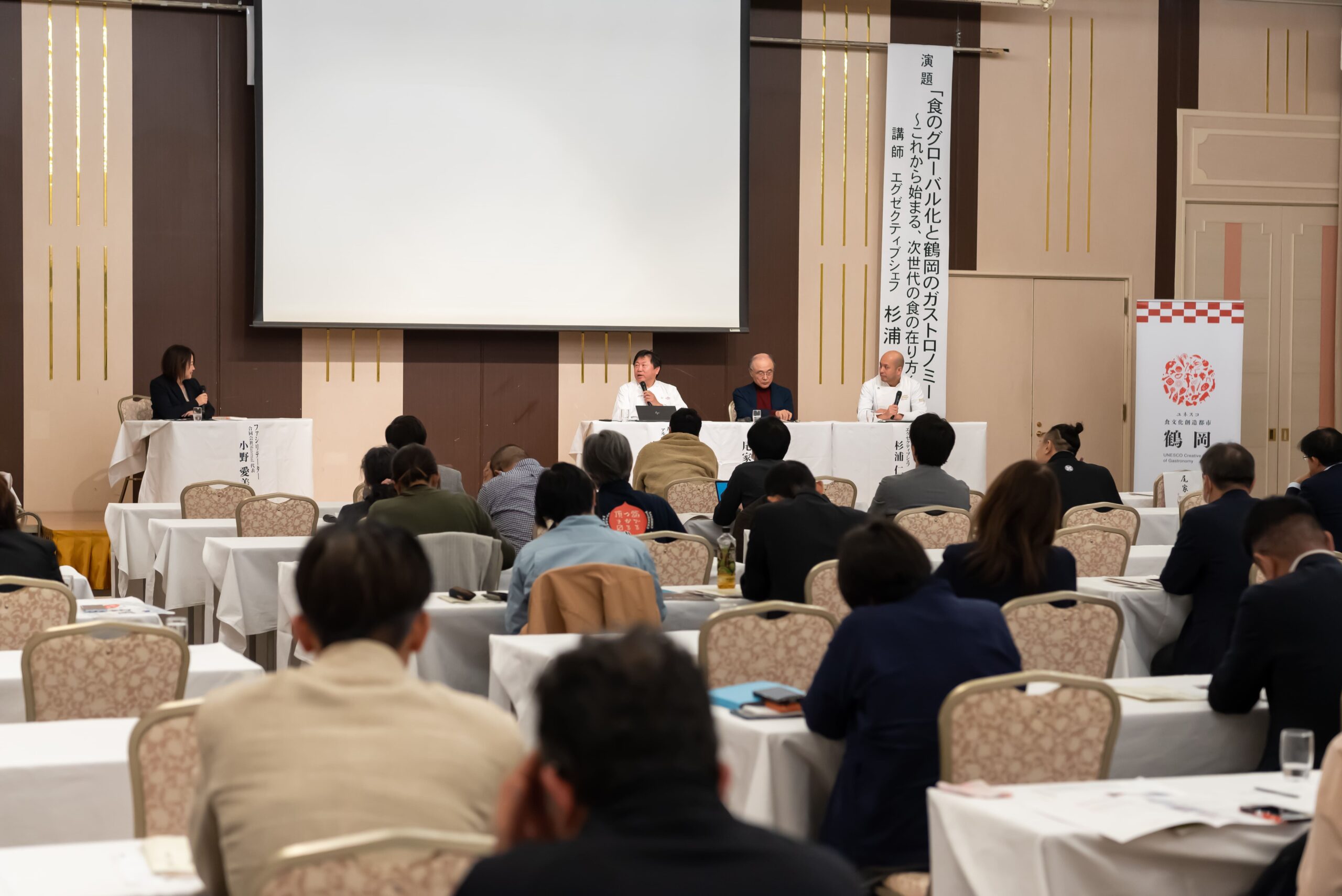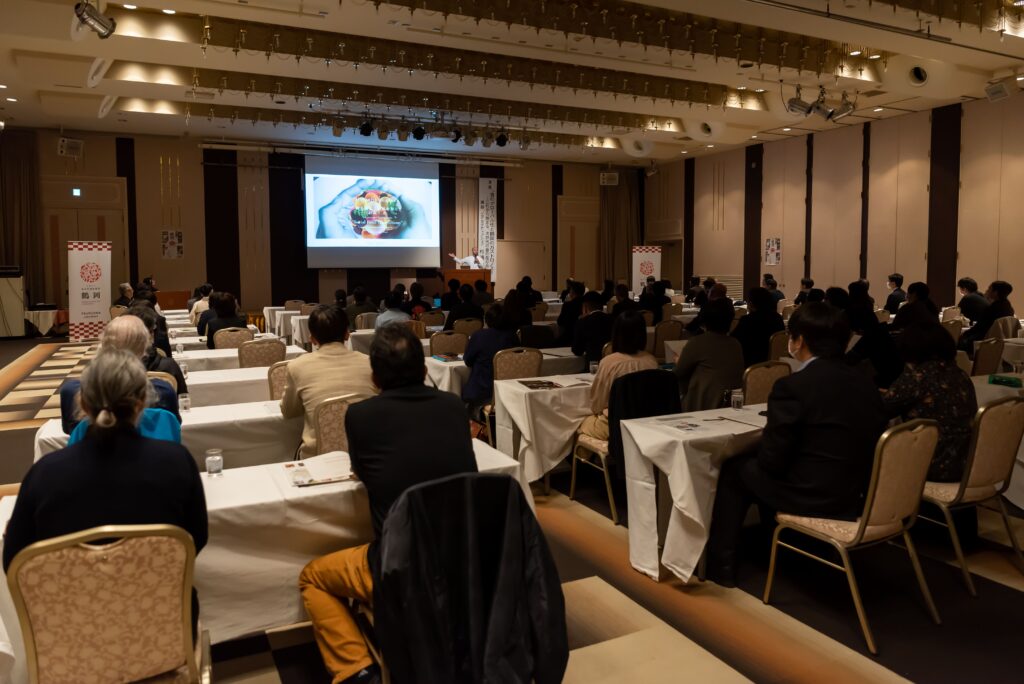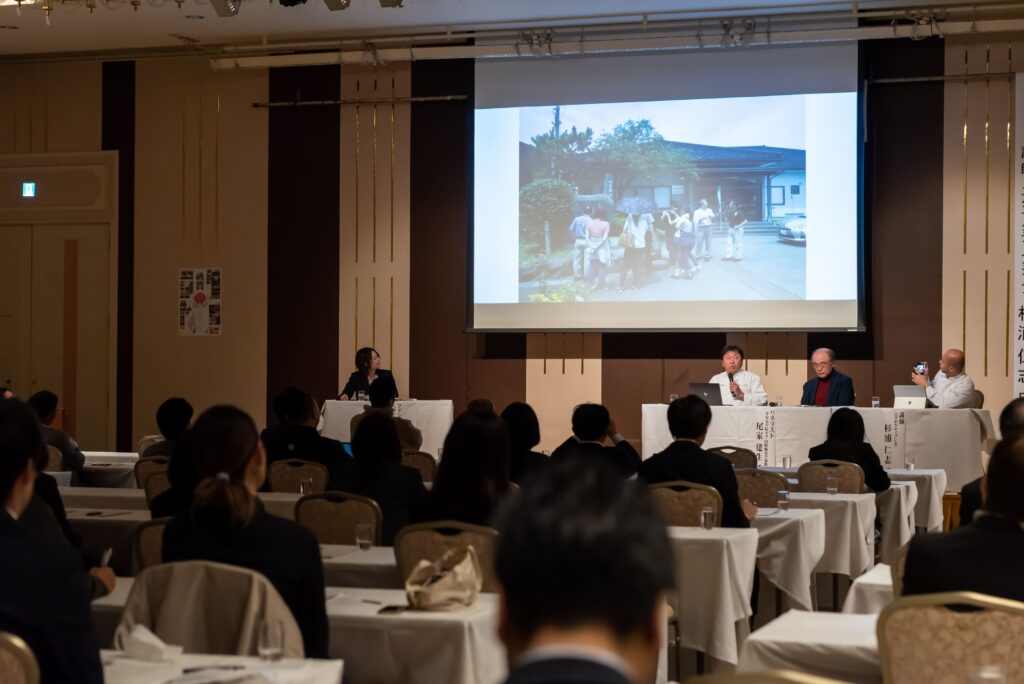
Report on the Gastronomy Summit Held on November 14, 2023.
“The Necessity of ‘Collaboration’ Consciousness for Becoming a ‘Gastronomic Sanctuary'”
On November 14, 2023, following the previous day’s “Tsuruoka Gastronomy Tourism: Exploring Dewa Sanzan Shojin Ryori,” the “Tsuruoka Gastronomy Summit” took place at the Tokyo Daiichi Hotel Tsuruoka. The focus of this summit was to explore how gastronomy tourism, emphasizing “culinary diversity” and catering to inbound foreign tourists, could become a strength in local tourism. The central theme revolved around how the region could foster consensus to progress in the same direction for the development of gastronomy tourism.
The event was divided into two parts. In the first part, titled “Globalization of Cuisine and Tsuruoka’s Gastronomy,” Chef Hitoshi Sugiura, a pioneer in vegan and plant-based cuisine in Japan who honed his culinary skills in New York and Los Angeles, delivered a keynote speech. The second part featured not only Chef Sugiura but also Masayuki Okuda, Owner Chef of the nationally renowned Italian restaurant “Al che-cciano,” and Tateo Oie, Professor of Gastronomy Tourism Research at Heian Jogakuin University, alongside facilitator Manami Ono from MATERNAL, a company contributing to the refinement of local gastronomy.
During Chef Sugiura’s keynote speech, the focus was on “culinary diversity.” He emphasized that by considering various reasons such as dietary restrictions or religious beliefs, ingredients that might be unsuitable for some individuals could still be enjoyed by a broader audience through vegetarian and vegan dishes. Chef Sugiura discussed the significant market size in countries like India, where half the population is vegetarian, and Taiwan, with a substantial vegetarian population. He also shared insights into the economic benefits, mentioning that in New York, a three-star vegan restaurant course could cost up to ¥37,000. The participants were captivated by the revelation that even vegetable-based dishes could yield high returns. Chef Sugiura asserted that Tsuruoka had the potential to benefit greatly from this field, especially with the presence of Shojin Ryori, which aligns well with vegetarian and vegan preferences. However, he stressed the importance of collaborative efforts with the local community, stating that chefs alone could not achieve this transformation.

The participants responded positively, not only appreciating the gained knowledge of vegan and vegetarian basics but also making proactive suggestions such as the importance of a “food network” and the potential for “problem-solving through food.” The session became an opportunity for participants to reevaluate the allure of Tsuruoka’s cuisine.
In the second part, the theme was “What Defines Tsuruoka’s Gastronomy Tourism,” focusing on “what is necessary to become a tourist destination for gastronomy.” Professor Oie referenced Tuscany, Italy, known for its art and cuisine, particularly in Florence. He highlighted how gastronomy has become a centerpiece of tourism and the economy, with wine, cheese, and pasta being not only locally enjoyed but also exported. Professor Oie expressed hope that Tsuruoka could achieve a similar status amidst the current globalization of Japanese cuisine. Chef Okuda, who has been a driving force behind local gastronomy, shared his approach of introducing producers during interviews and conveying the excellence of both producers and their products. He emphasized that this approach not only benefits the producers but also instills pride in their work. Chef Okuda unveiled the “Okuda-style Gastronomy Tour,” guiding chefs and business owners visiting Tsuruoka. Chef Okuda introduced the “Okuda-style Gastronomy Tour,” designed for chefs and business owners visiting Tsuruoka. The tour begins with a visit to the fish memorial tower at Zempo-ji temple, where participants pay their respects. The course then unfolds, revealing the history of Tsuruoka’s culinary culture, starting with the abundance of sake produced in the former tenryo (territory directly controlled by the shogunate) of Oyama, which contributed to the development of pickles. This historical journey traces the roots of Tsuruoka’s food culture up to the present day. The tour concludes with a full-course meal crafted from ingredients harvested along the route, showcasing a thoughtful narrative that allows participants to feel the story of the region. Chef Okuda believes that these creative elements align Tsuruoka with the vibrant cities of Italy and France, contributing to a sense of equality among them.
Next, when Mr. Ono raised the topic of “consensus building within the community,” Chef Sugiura expressed the importance of the community in becoming a collaborative region. Given Tsuruoka’s rich cultural scene, he expressed hope for the formation of a community that transcends genres. Furthermore, to make the community appealing, Chef Okuda added, based on his experience, that it’s crucial to understand one’s strengths and distinctive features. He emphasized that individuals need to take the initiative to get things moving.

Finally, when asked about challenges, Professor Oie expressed concerns about the future of the inbound tourism boom. The sustainability of this boom over the next ten years is uncertain, and he anticipated intensified city-to-city competition worldwide for attracting tourists. To overcome this collaborative challenge, Mr. Oie emphasized the importance of globally promoting Tsuruoka’s gastronomy, stating that the gastronomy needs to become an attraction. He pointed to Tsukiji Market as a good example and proposed three ideas: food festivals as attractions, food tours around the region like Chef Okuda’s suggested tour, and freely exploring food-related places along a food trail.
Chef Okuda, while praising the excellence of the materials produced in the Shonai region, raised the challenge of nurturing the next generation. He emphasized that passing down the region’s culinary culture, including the use and preparation of traditional crops, is indispensable for Tsuruoka Gastronomy Tourism.
Participants expressed opinions such as “renewed recognition of Tsuruoka’s high potential” and voiced expectations for further growth. However, in the field of “collaboration,” chosen as a discussion theme, opinions emphasized the importance of unity throughout Tsuruoka city. The diversity of attractions led to a sense of frustration and difficulty in achieving unity, as reflected in the survey results.
| Delicious Tsuruoka Gourmet Journey | https://www.tsuruokacity.com/lp/gastronomy-tourism/ |
